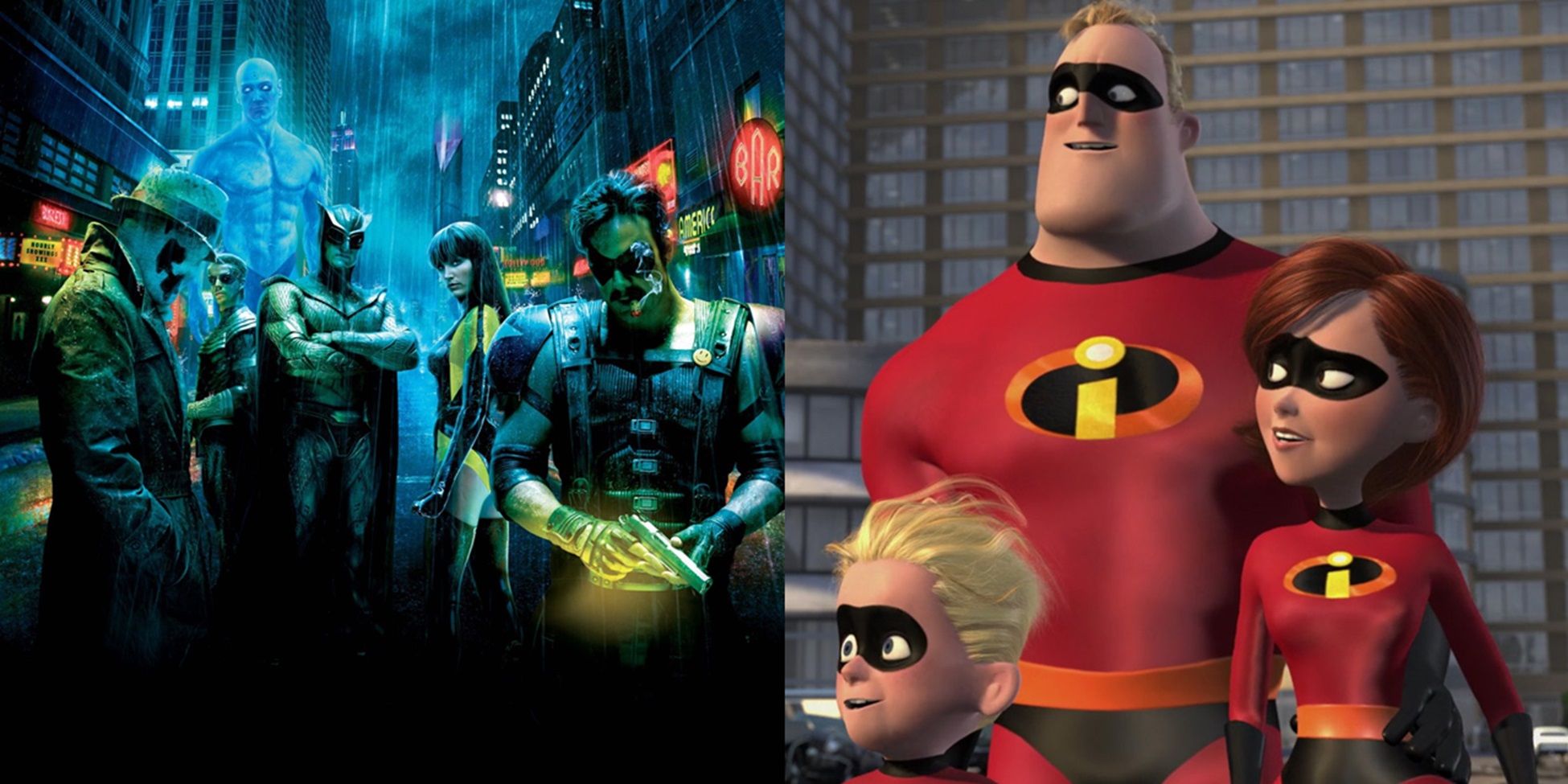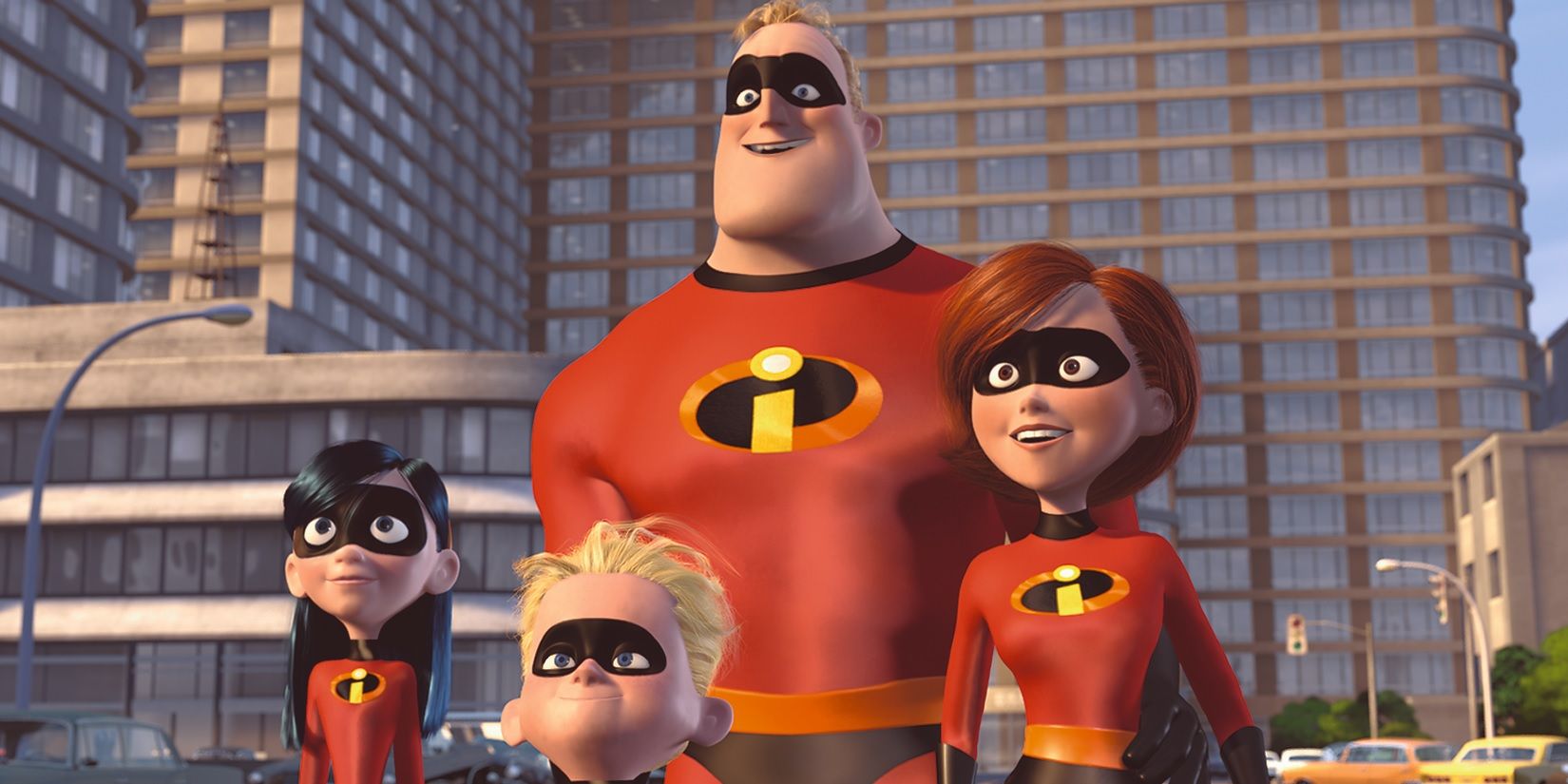
It’s hardly a hot take to compare Brad Bird’s animated feature The Incredibles with Alan Moore and Dave Gibbons’ graphic novel Watchmen, because parallels were drawn between the two as soon as the Pixar movie hit theaters in 2004. If there’s one distinction between the two, it’s that Moore’s comic is a deconstruction of the superhero myth for grownups and Bird’s movie is a deconstruction of the same myth for children. Watchmen has been called “the moment comic books grew up.” The Incredibles wasn’t exactly the moment cartoons grew up – like all Pixar movies, it appeals to viewers of all ages – but it did recycle some of the themes from Watchmen to make them more digestible for younger viewers.
Both Watchmen and The Incredibles are captivating superhero stories with retro visuals that take place in the “real” world and explore what the reality of superheroes would be as opposed to the fantastical, optimistic worldview of stories about characters like Superman and the Fantastic Four. Instead of being celebrated, after making one mistake too many with the immense powers they’re grappling with, superhumans are vilified and banished from society, forced into hiding on the fringes. In both cases, superheroes settle into civilian life to protect their real identity. It’s a poignant subversion of the idea of a superhero’s mask. The real mask is the alter ego, like Clark Kent or Bruce Wayne – or Bob and Helen Parr, for that matter, although Helen finds it a lot easier to let go of her super-persona than Bob.
RELATED: Soul: How Pixar's Imaginary Worlds Create Meaningful Stories
Moore’s work on Watchmen is noted for its use of much darker themes and storylines than readers would usually find on the pages of superhero comics. Similarly, Bird’s script for The Incredibles deals with surprisingly heavy subject matter for a children’s animated movie. It has torture and marital tensions and children being shot at and a suicide attempt and people getting sucked into jet engines, which is a lot for kids to handle. But ultimately, it is a family-friendly cartoon.

The main characters of Watchmen and The Incredibles line up pretty well. As an aging super who can’t face reality and insists on reliving the glory days, Mr. Incredible can be compared to Rorschach (and that would make Frozone, as Mr. Incredible’s closest confidant, the Nite Owl of the equation). As another aging super who left it behind and settled into suburban life, Elastigirl can be compared to Silk Spectre. As a genius optimist-turned-cynic who goes mad, Syndrome can be compared to Ozymandias. The kids are an anomaly, although Jack Jack’s expansive library of superpowers recalls the omnipotence of Dr. Manhattan.
In unraveling its many story threads, Watchmen’s timeline jumps all over the place. The Incredibles follows a linear story timeline – five-year-olds have to be able to comprehend the plot, after all – but it does open with a prologue that details Bob and Helen’s dark backstory. Once upon a time, they were on top of the world. Superheroes were the biggest celebrities in America and they worked with the police to fight crime and save lives. But after one fateful night, superheroics were illegalized and had to hide their abilities from society or face the long arm of the law. Then, it picks up with the Parrs’ tranquil suburban existence years later. There’s plenty of fun to be had transplanting superpowers into relatable domestic situations, but the prologue gives the movie the same dark subtext as Watchmen’s alternate history. The Incredibles doesn’t make any radical changes to America’s past like the Watergate scandal remaining a secret or the U.S. winning the Vietnam War, but its opening scene does position it in a post-superhero world.
The driving external conflict in The Incredibles sees a disgruntled superhuman picking off ex-superheroes, which is also the driving external conflict in Watchmen. The emotional conflicts are very different, of course, because Watchmen’s graphic depictions of genocide and sexual assault certainly wouldn’t fly with the Disney crowd. Instead, Bird focused The Incredibles on a family. His years working on The Simpsons had made him more than familiar with the process of turning grounded family situations into animated hilarity. The family element is what sets The Incredibles apart from Watchmen. But just like the fractured relationships in Watchmen ring painfully true, the Parrs feel like a real family, warts and all. Bob keeps secrets from Helen and Dash gets in a lot of trouble at school, but the love shared by all these characters is palpable from start to finish.
Like any great genre deconstruction, both Watchmen and The Incredibles satisfy as entries in the genre they critique. There are a bunch of big, exciting set pieces in both stories and characters like Rorschach and Frozone have become as iconic as any other superhero. While The Incredibles can be enjoyed as a straight superhero story without any risk of audiences taking away dangerous misconceptions, Watchmen’s complicated ethics have led to it being misinterpreted by many readers who look up to its morally-squiffy antiheroes – and especially by viewers of the film adaptation helmed by Zack Snyder, who appears to have misinterpreted the comic himself.
While HBO’s critically acclaimed miniseries continuation is undoubtedly the greatest on-screen portrayal of the Watchmen universe, The Incredibles does a better job of packaging Moore’s themes and ideas than Snyder’s indulgent movie did. And in addition to being the best unofficial Watchmen movie, as a lighthearted superhero story about the importance of family, The Incredibles also functions as the best unofficial Fantastic Four movie to date.

